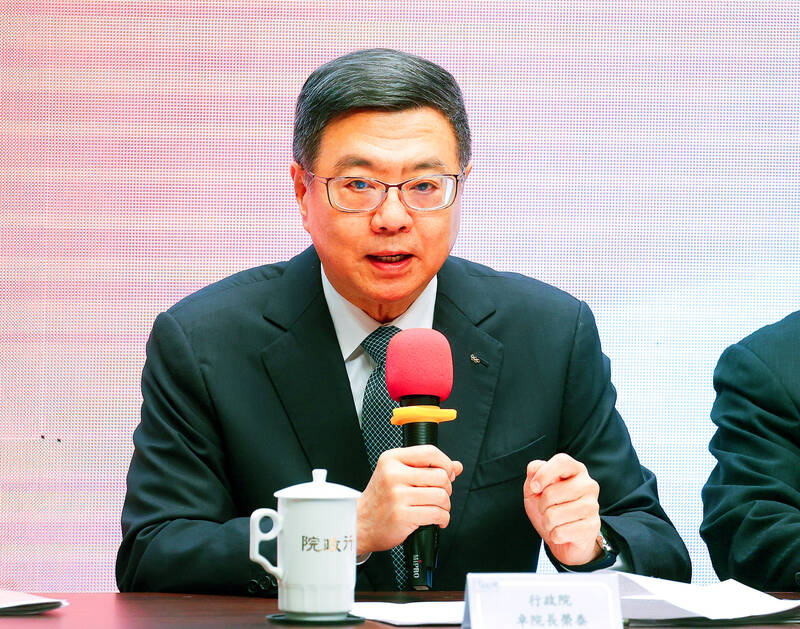The Economic Development Committee yesterday detailed its plans and drafted a proposal aiming to attract domestic and international investment into vital industries, which are valued at NT$3 trillion to NT$4 trillion (US$92 billion to US$123 billion).
Premier Cho Jung-tai (卓榮泰) chaired the first meeting of the committee and in the opening statements said that it has a mission, and the government is determined to embrace innovation, be more open and keep abreast of the times.
If approved, the proposal would require drafting new laws to ensure that the Grand Taiwan Investment policy is launched successfully, Cho said.

Photo: CNA
The committee also passed a proposal to establish an Asian asset management center with Taiwanese characteristics, Cho said.
The center would take advantage of the Financial Supervisory Commission’s expertise in analysis to better use Taiwanese slush funds, he said, adding that it would aim to create a better environment for the financial industry and “green banking.”
The committee also approved a proposal to teach 200,000 people artificial intelligence techniques and attract 120,000 foreigners with expertise, he said.
The committee would convene at least once a quarter, and meetings are expected in September and November, with a consultants’ meeting expected to be held next month, he said.
Separately, President William Lai (賴清德) met with the members of the World Taiwanese Chambers of Commerce (WTCC) and said the nation has passed policies to attract more Taiwanese businesspeople based overseas with an aim to build a better and more prosperous nation.
Lai thanked the WTCC and Taiwanese businesspeople overseas for promoting Taiwan and being the “bridge” between the nation and other countries.
He also thanked the WTCC for raising NT$10 million following the April 3 earthquake in Hualien.
His inaugural address laid out three principles regarding how Taiwan’s industries could develop — embracing the future and technology, expanding into space and the maritime sector, and resolving investment issues to encourage foreign investors — to ensure a better and more prosperous future for the nation, Lai said.
Meanwhile, the Executive Yuan yesterday approved a Ministry of Health and Welfare proposal to launch a four-year program, with an estimated cost of NT$13.5 billion to improve medical treatment for children.
The program would continue a 2020 program to improve children’s medical care, which would end this year.
The new program aims to implement continuous healthcare for newborns, beginning from the prenatal period, the ministry said.
It also aims to enact a tiered system for children’s emergency hospital care, it said.
Personnel training on the handling of newborns, and children’s cancer, severe and genetic-related cases would be prioritized, the ministry said.

SECURITY: As China is ‘reshaping’ Hong Kong’s population, Taiwan must raise the eligibility threshold for applications from Hong Kongers, Chiu Chui-cheng said When Hong Kong and Macau citizens apply for residency in Taiwan, it would be under a new category that includes a “national security observation period,” Mainland Affairs Council (MAC) Minister Chiu Chui-cheng (邱垂正) said yesterday. President William Lai (賴清德) on March 13 announced 17 strategies to counter China’s aggression toward Taiwan, including incorporating national security considerations into the review process for residency applications from Hong Kong and Macau citizens. The situation in Hong Kong is constantly changing, Chiu said to media yesterday on the sidelines of the Taipei Technology Run hosted by the Taipei Neihu Technology Park Development Association. With

‘FORM OF PROTEST’: The German Institute Taipei said it was ‘shocked’ to see Nazi symbolism used in connection with political aims as it condemned the incident Sung Chien-liang (宋建樑), who led efforts to recall Democratic Progressive Party (DPP) Legislator Lee Kun-cheng (李坤城), was released on bail of NT$80,000 yesterday amid an outcry over a Nazi armband he wore to questioning the night before. Sung arrived at the New Taipei City District Prosecutors’ Office for questioning in a recall petition forgery case on Tuesday night wearing a red armband bearing a swastika, carrying a copy of Adolf Hitler’s Mein Kampf and giving a Nazi salute. Sung left the building at 1:15am without the armband and apparently covering the book with a coat. This is a serious international scandal and Chinese

A US Marine Corps regiment equipped with Naval Strike Missiles (NSM) is set to participate in the upcoming Balikatan 25 exercise in the Luzon Strait, marking the system’s first-ever deployment in the Philippines. US and Philippine officials have separately confirmed that the Navy Marine Expeditionary Ship Interdiction System (NMESIS) — the mobile launch platform for the Naval Strike Missile — would take part in the joint exercise. The missiles are being deployed to “a strategic first island chain chokepoint” in the waters between Taiwan proper and the Philippines, US-based Naval News reported. “The Luzon Strait and Bashi Channel represent a critical access

COUNTERINTELLIGENCE TRAINING: The ministry said 87.5 percent of the apprehended Chinese agents were reported by service members they tried to lure into becoming spies Taiwanese organized crime, illegal money lenders, temples and civic groups are complicit in Beijing’s infiltration of the armed forces, the Ministry of National Defense (MND) said in a report yesterday. Retired service members who had been turned to Beijing’s cause mainly relied on those channels to infiltrate the Taiwanese military, according to the report to be submitted to lawmakers ahead of tomorrow’s hearing on Chinese espionage in the military. Chinese intelligence typically used blackmail, Internet-based communications, bribery or debts to loan sharks to leverage active service personnel to do its bidding, it said. China’s main goals are to collect intelligence, and develop a